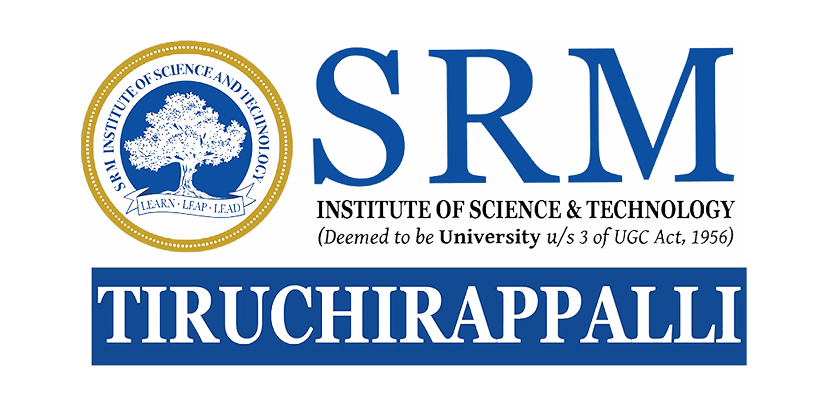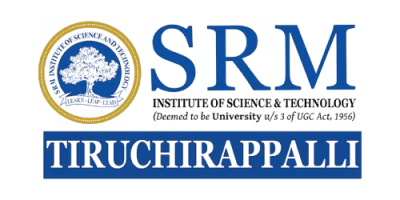B.Tech Information Technology
The Department of Information Technology at the SRMIST, Tiruchirappalli Campus offers the undergraduate programmes B.Tech IT. The program aims to prepare the students for the challenges that they will face as professionals in IT and ITES industries. As an academic discipline, B.Tech IT focuses on imparting education to the students that will help them to meet the needs of users through selection, creation, application, integration and administration of computing technologies.
Our teaching- learning process aims to mould students to consistently perform well in the industry and also motivates them to pursue their higher studies. Special placement training has been given to the final year students that will enable them to get marquee offers through campus placement. The Department also encourages the students to do projects, presentation on technical papers, attending technical workshops, sports and cultural activities. The department has competent faculty with rich industry, research and academic experience. The department has MoU with reputed IT industries.
Programs offered
B.Tech. Information Technology
B.Tech (IT) is the field of study, devise, development, execution, support and running of computer-based information systems. Information Technology or IT is an engineering division that covers both software and hardware sectors. It helps to generate, manage, store, communicate, and flow information. Information Technology refers to the application of technology to solve business processes.IT deals with management of computers rather than computation. IT is a combination of programming, hardware administration, software administration, networking and network security. Information Technology is a narrower and more focused field and entails subjects like networking technology for digital devices, financial accounting and management of technological innovation, digital communication, Internet technology and applications, computer simulation modelling, image processing, multimedia systems and project management.
Vision & Mission
Vision
To nurture as globally recognizable department in imparting the students high quality education and providing high confidence, unique knowledge and research experience in the field of networking, cyber security, forensics, information technology, cognitive computing and IoT.
Mission
- To provide world class IT professionals with appropriate industry and research based curriculum
- To train the students in such a way that it leads to entrepreneurship and develop societal need based industries
- To nourish the students as socially responsible professionals by providing them training in personality development, ethics and leadership.
Program Educational Objectives (PEO)
PEO – 1 Graduates will be able to perform in technical/managerial roles ranging from design, development, problem solving to production support in software industries and R&D sectors.
PEO – 2 Graduates will be able to successfully pursue higher education in reputed institutions.
PEO – 3 Graduates will have the ability to adapt, contribute and innovate new technologies and systems in the key domains of Computer Science and Engineering.
PEO – 4 Graduates will be ethically and socially responsible solution providers and entrepreneurs in Computer Science and other engineering disciplines.
PEO – 5 Graduates will create local and global impact of computing on individuals, organizations, and society.
PEO – 6 Graduates will use current techniques, skills and tools necessary for computing practice
Program Objectives (PO)
- Engineering knowledge:Apply the knowledge of mathematics, science, engineering fundamentals, and an engineering specialization to the solution of complex engineering problems.
- Problem analysis:Identify, formulate, review research literature, and analyze complex engineering problems reaching substantiated conclusions using first principles of mathematics, natural sciences, and engineering sciences.
- Design/development of solutions:Design solutions for complex engineering problems and design system components or processes that meet the specified needs with appropriate consideration for the public health and safety, and the cultural, societal, and environmental considerations.
- Conduct investigations of complex problems:Use research-based knowledge and research methods including design of experiments, analysis and interpretation of data, and synthesis of the information to provide valid conclusions.
- Modern tool usage:Create, select, and apply appropriate techniques, resources, and modern engineering and IT tools including prediction and modeling to complex engineering activities with an understanding of the limitations.
- The engineer and society:Apply reasoning informed by the contextual knowledge to assess societal, health, safety, legal and cultural issues and the consequent responsibilities relevant to the professional engineering practice.
- Environment and sustainability:Understand the impact of the professional engineering solutions in societal and environmental contexts, and demonstrate the knowledge of, and need for sustainable development.
- Ethics:Apply ethical principles and commit to professional ethics and responsibilities and norms of the engineering practice.
- Individual and team work:Function effectively as an individual, and as a member or leader in diverse teams, and in multidisciplinary settings.
- Communication:Communicate effectively on complex engineering activities with the engineering community and with society at large, such as, being able to comprehend and write effective reports and design documentation, make effective presentations, and give and receive clear instructions.
- Project management and finance:Demonstrate knowledge and understanding of the engineering and management principles and apply these to one’s own work, as a member and leader in a team, to manage projects and in multidisciplinary environments.
- Life-long learning:Recognize the need for, and have the preparation and ability to engage in independent and life-long learning in the broadest context of technological change.
Program Specific Outcomes (PSO)
PSO-1 Ability to Utilize Concepts and Practices in Information Technology
PSO-2 Evaluate and Administer Information Technology Systems
PSO-3 Effective Integration of Information Technology Systems and Practice

